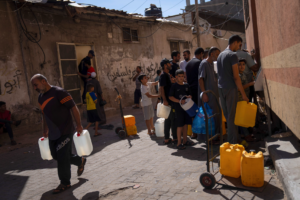
An Imperative for East African Nations to Strengthen Regional Trade for Economic Resilience Amidst Growing Geopolitical Fragmentation and Conflict
Louder Drums of War
While the impending war in the Gaza Strip fueled by the long-standing conflict between Palestine and Israel is bound to shift the global attention from Kyiv and Moscow, the two illustrate the rising risk of geopolitical fragmentation slowing down global economic integration. These developments intensify a period of increased trade tensions globally with over 3,000 protectionist trade policies reported relative to less than 1,000 liberalizing policies since the 2009 financial crisis.
Thus, in a world marked by mounting global economic fragmentation, East Africa Community (EAC) member nations must chart a path toward enhanced economic resilience. If the COVID-19 economic fallout and the growing geopolitical tensions are anything to go by, nations within the EAC must take decisive steps to diversify export destinations, import sources, and patterns of cross-border value chain integration by boosting regional trade. This can help the nations to easily weather the storms of geopolitical fragmentation and further fortify their economies for a more sustainable future.
The Stifling Shadows of Global Fragmentation
The international economic landscape is undergoing a seismic shift. After decades of burgeoning global economic integration, the world now confronts the stark reality of fragmentation. Global trade, once the engine of economic growth, has plateaued, and this stagnation is a direct consequence of rising protectionism. The intensifying trade tensions between the United States and China, coupled with trade restrictions imposed due to the COVID-19 pandemic and conflicts like Russia’s war in Ukraine, have left the global economy vulnerable.
The protectionist measures and supply chain restructuring initiatives by the G7 pose significant challenges, potentially exacerbating this fragmentation. For nations within the EAC, the consequences are tangible. As international trade becomes more uncertain and susceptible to shocks, there is a pressing need for the member countries to bolster their economic resilience. Geopolitical fragmentation, if not addressed effectively, could disproportionately affect low-income countries within the EAC, making it imperative to explore regional alternatives.
The Mineral and Commodity Silver Lining
Despite the challenges posed by geopolitical fragmentation, there is a glimmer of hope for African economies, particularly those within the EAC. While the nations have an abundance of minerals, including natural gas in Tanzania and Oil in Kenya, South Sudan, and Uganda, the mining sector only contributes only about 2.3% of the East African regional GDP and thus could generate more foreign exchange earnings. The region equally produces significant amounts of commodities including coffee and tea which could be leveraged to build resilience through seamless cross-border trade. The increased global competition for commodities and critical minerals offers an opportunity for these nations to deepen their integration into global value chains as upstream suppliers of raw materials. This presents an opportunity for collaboration between the EAC nations, guided by their comparative advantages, to strengthen their collective global economic foothold although it must be strategically handled.
Diversifying Export Destinations

One of the critical strategies to enhance economic resilience within the EAC is to diversify export destinations. Amid global tension, slowing and collapsing global supply chains, and protectionist policies, EAC nations cannot afford to slumber. Guided by the promise of the East African Community to integrate the region and grow a single market and the African Continental Free Trade Area (AfCFTA) in doing the same for the continent, diversifying export destinations domestically is now simpler. As heavy reliance on a single export market can expose a nation to significant risks if that market becomes unstable due to geopolitical tensions or economic fluctuations, this is a wake-up call for EAC to explore opportunities in Africa. Whether collectively or as individual nations, EAC member countries must now actively explore new markets for their goods and services within the continent to fortify their resilience.
The diversification efforts should start with closer cooperation between the EAC nations guided by the regional economic bloc trading protocols. The East African Community presents an existing framework for promoting regional trade. Moreover, in seeking the continental alternative market, the AfCFTA offers a guided investment protocol for single and less protected national markets to actualize this endeavor. By strengthening these alliances and streamlining trade policies and regulations, member nations can collectively tap into new export markets. EAC nations should also engage in diplomatic efforts to forge partnerships and trade agreements with countries and regions outside and within Africa.
Import Sources and Cross-Border Value Chain Integration
EAC nations must also diversify import sources and integrate themselves more deeply into cross-border value chains. Dependence on a limited number of import sources in a changing global political and economic climate can expose nationals to supply chain disruptions and price fluctuations. Kenya is for instance contenting with unprecedented oil price fluctuations with pump prices growing four months in a row past the $2 mark per liter amid the Russia-Ukraine tensions. Wheat, a staple food source of the East African region and majorly sourced from Russia and Ukraine has compromised food security in the region further. Thus, by diversifying import sources, EAC countries can reduce their vulnerability to economic shocks.
This also calls for EAC nations to actively engage in cross-border value chain integration. This means creating seamless links between the countries within the community, allowing for the free flow of goods, services, and skilled labor to mitigate emerging trade slowdowns as a result of geopolitical tensions and complications. Such integration promotes efficiency, reduces costs, and makes the EAC a more attractive partner for international trade further enhancing nation and regional resilience.
“African countries, and by extension the EAC, are particularly vulnerable to shocks affecting their export relationships with individual partner countries due to their above-average concentration of export destinations.”
Enhanced Regional Trade
The East African Community, established with the goal of enhancing economic integration among member nations, is a valuable platform for boosting regional trade. Capitalizing on comparative advantages in areas of commodity, agriculture, and service sectors can improve the self-sufficiency of the nations amid rising supply chain disruptions. However, to maximize its potential, the EAC needs to overcome several challenges that have slowed down the EAC integration and cross-border trade growth. This includes harmonizing trade policies, reducing non-tariff barriers, and creating an environment conducive to private sector investment and innovation.
Concerns have emerged on the infrastructural development in East Africa and its impact on regional integration and cross-border goods flow. Electricity supply constraints, poor access to information and communication technology, and weak transport network in the region is of great deserve to cross-border trade. Thus, improved transportation, logistics, and telecommunications networks are vital for facilitating regional trade. This infrastructure not only reduces the cost of doing business but also encourages cross-border trade by making it more efficient and reliable.
In the future, African countries, and by extension the EAC, are particularly vulnerable to shocks affecting their export relationships with individual partner countries due to their above-average concentration of export destinations. The AfCFTA is a transformative initiative aimed at creating a single African market for goods and services. It offers African nations a unique opportunity to diversify their export destinations and reduce their reliance on a limited number of trading partners. EAC countries must actively participate in and support the AfCFTA, using it as a tool to expand their export markets and achieve greater economic resilience.
Going forward, this is a challenge and an opportunity that demands unwavering commitment and concerted efforts from the leaders and citizens of the EAC. In unity and strategic planning, these nations can not only weather the storms of economic change but emerge stronger and more resilient. It is a journey worth embarking upon for the prosperity and stability of the East African Community.
Muoki Musila is an Kenyan based economist. These are the writer’s own opinions and do not necessarily reflect the viewpoints of Liberty Sparks. Do you want to publish in this space? Contact our editors at [email protected] for further clarification.



